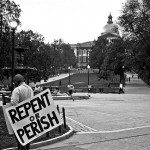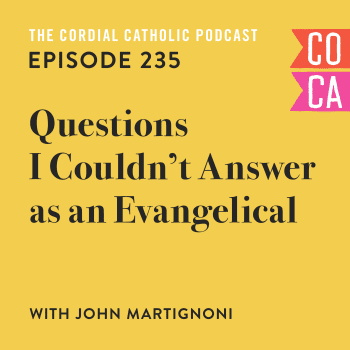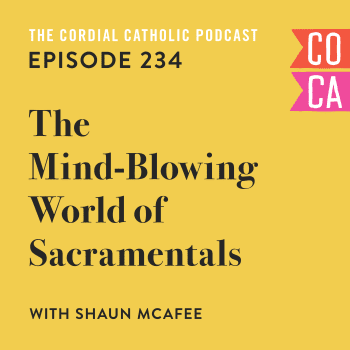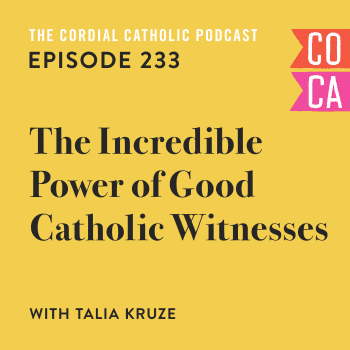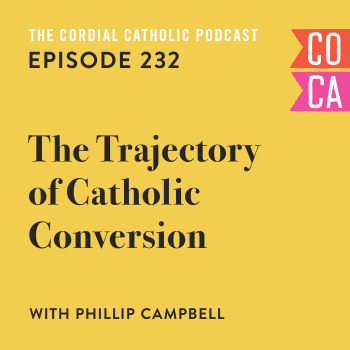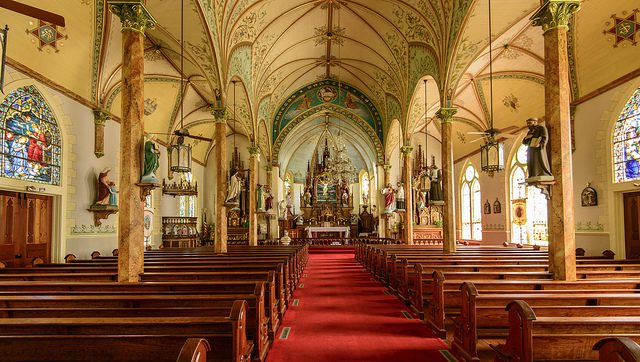
The sometimes torrential flow of Catholics leaving the Church for Evangelical traditions can be baffling for the uninitiated.
What would possess someone to leave the Catholic Church?
With access to the ancient sacraments and a Church which traces its lineage and authority structure back to the Apostles would could possibly be more enriching? More attractive?
It might confound those in love with their Catholic faith but I’ve had just these conversations and, likely, you have too. Likely you know someone—or several people—who were raised Catholic but now practice their faith elsewhere, or nowhere.
So what makes them leave?
And, more importantly, how can we get them to stay?
What Makes an Incredible Parish?
As I was preparing to enter the Catholic Church as an Evangelical I sat amongst well-meaning Catholics, teaching me about the Catholic faith, who barely knew anything about it themselves. When pressed on the not-particularly-fine points of pious practice, these catechists fumbled for basic answers.
Why do we genuflect before the tabernacle? I’d ask.
The answer came: I’ll have to look that one up.
These same truly well-intentioned folks then lamented to me how their own children—roughly my age—stopped attending Mass a decade ago. They just didn’t see the point.
They’d wring their hands and wonder if I knew where they’d gone wrong.
And I think I do know, although I don’t think I did at the time.
Because there are incredible parishes out there; parishes that are filled to the brim and filling still. Parishes which seem magnetic, that are attracting Catholics from across their diocese—that are creating, baptising, and evangelizing new Catholics.
And that are stealing away Evangelical converts like me.
So what makes a parish incredible?
There are, I think, three key ingredients and you may have already guessed one.
First, is what many of my older catechesis teachers were missing: solid Christian education. Second, is a focus on relationship building and, third, the absolute centrality of the Eucharist and prayer.
We Need to Teach What We Believe
It’s no secret that the generation raised in the wake of the Second Vatican Council were deeply deprived of good Christian education.
The ramifications are astounding.
The seemingly needless confusion surrounding how the Church was changing and the tumultuous time that followed left many priests without good theological, spiritual, and pastoral formation. It’s an unfortunate fact; and many of these priests, in turned, could pass on only what they knew.
As an Evangelical entering the Catholic Church I was taught by just those folks.
Catholics who’d be baptised and raised in the tradition but didn’t know a single thing about it. The number of these well-meaning Catholics who don’t know that the Eucharist is considered to be the actual body and blood of Christ is just one telling indicator.
Going forward our incredible parishes need to place serious emphasis on Christian education. For children, for youth, for young adults and up—and we cannot assume that just because someone was raised Catholic their whole life that they know what they’re doing; look at my well-intentioned catechists.
We Need Opportunities for Relationships
The second thing our incredible parishes need to focus on is relationship building.
Nearly every single Catholic who leaves the Church for an Evangelical tradition says the same thing; it’s the people, the relationships, that draw them in.
What Evangelicals are good at is emphasising their communities and their relationships with each other, and with Christ.
In fact the oft-heard phrase in Evangelical circles “personal relationship with Christ” isn’t something exclusively Evangelical. The idea is wholly Catholic too but so rarely heard, understood, or pursued that you’d think otherwise.
What our incredible parishes need to do is build in opportunities for us to fellowship with each other; to grow together and safely express our faith so that we can begin to reach out to others, fulfilling the Great Commission.
We need to be schooled and steeped in relationships.
We need opportunities to spend time together in our parishes outside of Saturday night and Sunday morning. And we need it badly.
And, no, we don’t need to turn into a social club and we must seriously protect against those tendencies but we do need to follow the example of the Early Church that fellowshipped, broke bread, and prayed together.
We need to work on becoming genuine disciples of Christ—something which takes all of us working together.
There’s absolutely nothing Catholic about showing up for Mass and zipping out of the parking lot before the priest has even finished his procession from the nave.
We need to darken the doors of our parishes as often as possible because we want to be there, because we have opportunities to build into each other, to help each other become more like Christ. Because we value these relationships.
We Need to Ultimately Focus on Christ
Finally, and ultimately, our incredible parishes need to be focused around the Eucharist and prayer.
After becoming Catholic I began a somewhat desperate search for a parish which felt like home. Too many I visited would fill up on a Sunday and remain empty every other night of the week. On the Sundays, when my wife came along she’d often remark and how uncomfortable everyone looked.
“Why does everyone keep their coats on?” She asked once. It wasn’t like it was all that cold.
But as soon as Communion was finished we found out.
It was, sadly, so they could be that much quicker to the parking lot.
When we finally did find a parish that felt right it was a parish which, beyond having great education and relationship-building opportunities, had a distinct focus on the Eucharist and prayer.
And this can get lost amongst a scramble to try and stem the flow of departing Catholics.
But it’s key.
The Eucharist must be the centerpiece.
What does this mean?
In our parish, for example, we have a chapel available for Eucharistic Adoration twenty-four hours a day. But beyond that, it means a parish that prayers regularly, and earnestly. A parish with a pastor and pastoral team at the helm that takes prayer seriously; that prays together, and for one another.
A parish which is, ultimately, focused on making the Eucharist the thing.
It’s both a mindset and a very practical reality.
And fundamental.
The Road to an Incredible Parish
Am I an authority on parish-building or disciple-making? Certainly not. I don’t have a ten-step system and I haven’t written a book about it but I do have some experience. As an Evangelical, I was part of an incredibly vibrant and growing church. My wife and I had all of our friends there, our resources, our support network both socially and spiritually and we left it all to become Catholic.
That was difficult.
And made more difficult by the fact that so few parishes we visited felt even remotely like the Christ-centered community we’d left behind.
Call it trial and error but when we did find a parish that had it we almost immediately knew.
The difference was stark; the comparison extreme. And we’ve done lots of thinking since then.
Expert? By no means. Experienced? I think so. But learning still.
What’s clear to me, at this point, is if we’re seriously about growing disciples of Christ. If we’re intentional about making our parishes places where Catholics can grow, encounter Christ, and fulfill the Great Commission we need to make sure some things and in place: Good Catholic education (and lots of opportunities for it), a serious commitment to building each other up (in the example of the apostles themselves), and centering everything we say, do, and think ultimately around the Eucharist and Jesus Himself through constant prayer.
It isn’t necessarily easy. It takes real change, real commitment, and, ultimately, real leadership but I promise you it also means real results—and an incredible parish.

